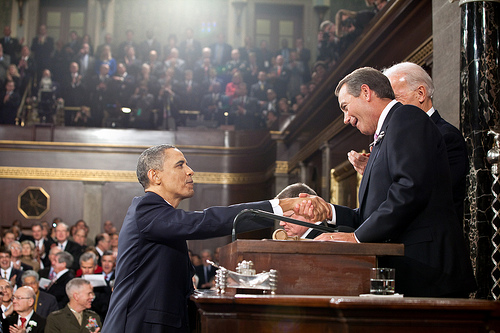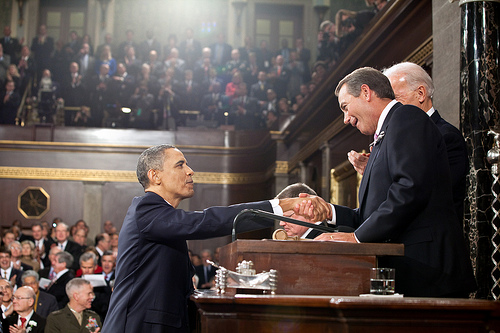 Obama’s politically difficult energy goals may not be ambitious enough.Photo: The White HouseA pair of features tackled the most fundamental barrier to the complete transformation of the planet’s energy system: scale.
Obama’s politically difficult energy goals may not be ambitious enough.Photo: The White HouseA pair of features tackled the most fundamental barrier to the complete transformation of the planet’s energy system: scale.
The first, by David Biello, writing for Yale e360, is one of the most comprehensive assessments of the scale problem to appear in recent memory, and contemplates what it would take to “replace all of the power-producing infrastructure that we have today within 40 years.”
The second, by Mason Inman, writing for National Geographic, warns that limited availability of certain scarce resources, such as the rare earth elements used in many cleantech applications, could be the ultimate bottleneck to even approaching powering the planet with 100 percent renewables.
In Standpoint Magazine, John Constable addresses the costs of a large-scale transition to renewables as they are currently playing out for the U.K. — where, he argues, “in private, the best-informed analysts now agree that Britain’s environmental policies have put the country on track to have the world’s most expensive electricity.”
Speaking at the recent Cleantech Investor summit, the former president of Shell Oil and founder of Citizens for Affordable Energy said the U.S. is going about energy policy “planlessly.” He blames this lack of coherent policy on two- and four-year election cycles.
This year’s State of the Union address: Whatever you do, don’t call it climate change: For those who follow climate and clean energy, the most notable change between this year’s State of the Union address and previous speeches by President Obama is our commander-in-chief didn’t mention climate change — at all.
However, his speech did lead with a discussion of clean energy, ranging from the ambitious goal of getting the U.S. to 80 percent clean energy by 2035 to a pledge to eliminate subsidies to oil companies. The president also mentioned the cultivation of energy innovation through research and development, and the potential for the U.S. to reach 1 million electric vehicles by 2015 — a goal Alexis Madrigal of The Atlantic deems insufficiently ambitious.
Opinion on whether or not the president made the politically savvy move by failing to mention climate is divided. David Roberts of Grist says no, as does Joe Romm of Climate Progress; Michael Shellenberger of the Breakthrough Institute says yes.
Meanwhile, the clean energy standard itself is up for debate; Michael Kanellos at GreenTech Solar argues by including natural gas, it pits a mature fossil fuel industry against renewables, with predictable results. ProPublica released a well-timed investigation questioning whether natural gas is all that “clean” in the first place, in terms of its benefits for the climate.
The oil industry panned the speech, of course, given that it included Obama threatening to take away what amounts to billions in tax breaks. The Heritage Foundation argued the focus on elimination of tax subsidies was misplaced; they’d like to see capital expenses handled differently in the first place, to make it easier for oil and gas companies to absorb the risk of drilling new wells.
The Hill has a more detailed account of the administration’s full proposal, which includes doubling spending on ARPA-E (the advanced research agency devoted to energy), doubling the number of “Innovation Hubs” devoted to energy, and increasing spending on research and development for specific applications, such as advanced batteries and vehicles.
Economics vs. people: “Estimates of lost world product due to climate change are moderate because the poor have so little to lose,” says Nobel Prize-winning economist Thomas Schelling in Newsweek. He points out if the world’s poorest billion lost half their income to climate change, it would amount to but one percent of world income, but the damage to their quality of life would be inestimable.
A new run of the “Dynamic Integrated Model of Climate and the Economy” using estimates of the sensitivity of Earth’s temperature to levels of greenhouse gases from the upper end of the spectrum of published results suggests the best way forward under these assumptions is to very rapidly decarbonize humanity’s energy system, ending the century at nearly the same level of atmospheric CO2 as the present day.
Journalist Mark Hertsgaard has been covering climate change for 20 years, but it didn’t occur to him until the birth of his own daughter that 2 billion young people would spend their entire lives contending with the impacts of climate change.
The Climate Post offers a rundown of the week in climate and energy news. It is produced each Thursday by Duke University’s Nicholas Institute for Environmental Policy Solutions.




